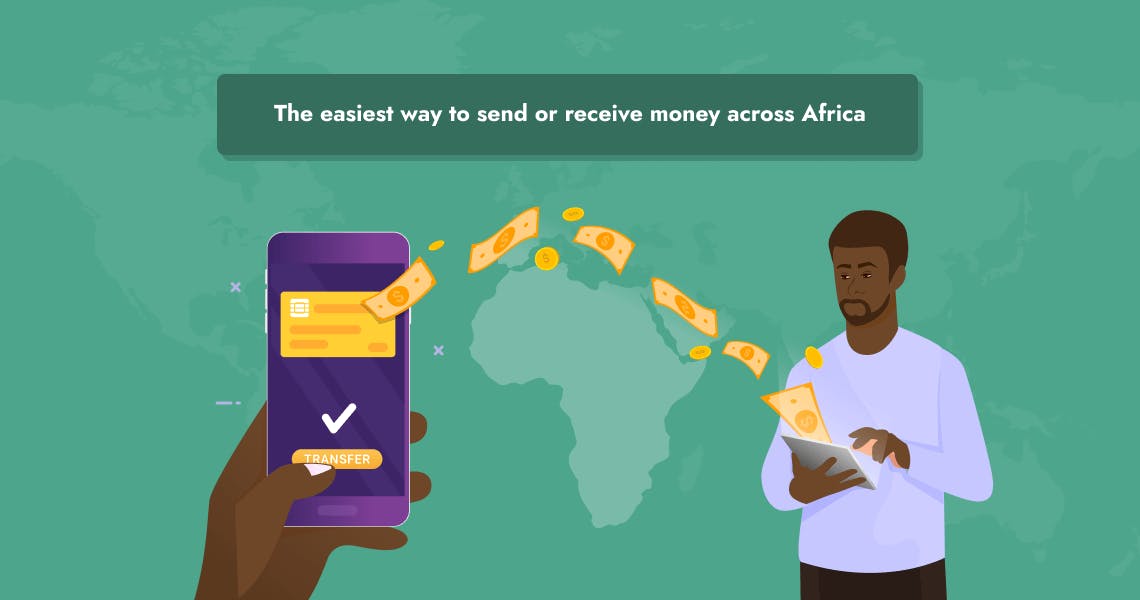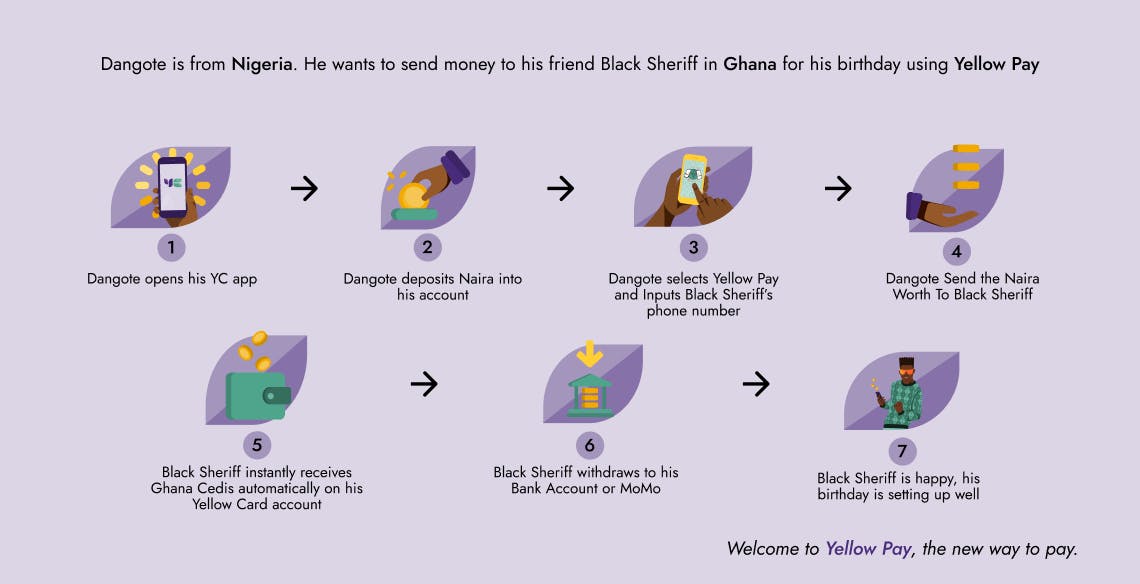The Easiest Way To Send And Receive Money Across African Borders
Insights
Back to blog
Clinton Nwachukwu
2022-08-16
Insights
On this page
The State of Cross Border Payment In Africa
The Need For Cross-Border Payment Solutions Across Africa
Crypto As The Ideal Digital Payment Solution For Africa
How To Make Payment Across Africa on Yellow Pay
How to Receive Money on Yellow Pay
Money makes the world go round, and people enjoy creating and moving it conveniently. Furthermore, users prefer tailored options that ensure payment information is secure. As a result, finance innovations seek to provide multiple opportunities for customers to pay across borders and enjoy a wholesome experience. We see this with the advent of mobile money, credit card payments, bank transfers and digital currencies.
Moving money across the world is essential for global businesses, many individuals, families, and countries that rely on them for business, sustenance, or foreign exchange.
People want financial solutions that allow them to send money to their near and dear ones who live in their native country. This article will examine the easiest way to send and receive payments across Africa.
The State of Cross Border Payment In Africa
If you've ever transferred money across Africa or tried to receive payments within Africa, you'll know how frustrating it is to deal with high fees and unfavourable exchange rates when sending money.
The World Bank estimates worldwide payments hit $689 billion in 2018 and $56 billion in 2017. Furthermore, the cost of transmitting money is too high to be beneficial. The global average price of sending $200 was roughly $14 in the first quarter of 2019. (7 per cent). The most expensive channels are banks and post offices, two of the most traditional money transfer service providers, which charge average fees of 11 per cent and 7 per cent, respectively.
Transferring money across African borders is enormous and includes hard and soft costs. These hard costs include fees charged for processing transactions and converting currencies. On the other hand, soft costs are unpredictable, such as currency price fluctuations, which can increase fees and transaction times.
Recently, cash transactions are gradually being replaced by new-generation contactless payment alternatives in traditional money transfers, such as what cryptocurrencies like bitcoin are making possible today. As a result, digital payment providers benefit both financially developing and developed countries.
The Need For Cross-Border Payment Solutions Across Africa
According to Statista, the digital payments category transaction value is expected to reach $127,262 million in 2022 and $166,373 million by 2025, with a 9.34 per cent CAGR between 2022 and 2025. This indicates that this is an area ripe for innovation and growth, with the coming years promising to be an exciting time for international B2B payments.
People worldwide seek a less expensive alternative because transfer fees increase over time. In particular, the travel and hospitality industries benefit from the anticipated simplification of cross-border payments. Africa's population is massive, and it requires a way to serve a thriving and ever-expanding market.
Crypto As The Ideal Digital Payment Solution For Africa
When sending money abroad, there are numerous options. However, we will look at what distinguishes the best. One such example is Yellow Pay, a financial product by Yellow Card which aims to bring financial inclusion to Africans and improve trade within the continent. Yellow Card services frequently provide better exchange rates, lower fees, and faster transfer delivery times.
While in recent times, several players have tried to solve this problem with international money transfers within Africa, a platform like Yellow Pay that leverages the bitcoin technology stands out the most in the following areas:
Transfer Fees:
Banks and international money transfer companies charge different fees, which could be fixed or a percentage. For example, as of May 2022, it costs over $10 to move money in Africa through Western union. However, the transaction costs for bitcoin-based transfers on Yellow Pay are mostly free, aside from your local bank charges.
See Transaction Rates Per Country Here.
Transfer Speed:
Some transfer service providers charge fees based on transfer speed. A faster transfer speed that takes hours to reach the recipient costs more money than a slower transfer speed. However, with cryptocurrency, it remains inexpensive and is completed in minutes.
Market Availability:
While the traditional markets close up over the weekends and certain hours of the workday, the crypto financial market is always open for trading engagements, which makes sense for something as high in demand as finance. The Yellow Pay customer service is onboard to ensure your transactions go smoothly.
Exchange Rate:
The exchange rate is the value of one currency to another. The rate is determined by the supply and demand for currencies at any given time. Banks and money transfer companies profit from the difference in currency exchange rates. Finally, sending money internationally without spending any money with them is difficult. You will be charged either a fee or a lower exchange rate.
Transferring cryptocurrency such as bitcoin is a low-cost, risk-free option that provides greater financial freedom than traditional cross-border cash transfers. This has contributed to the increased bitcoin trading volume in Africa.
Read More: How To Buy Bitcoin in Nigeria
How To Make Payment Across Africa on Yellow Pay
While crypto is widely becoming recognised as a cost-efficient method to send money across Africa, not everyone understands how it works, which is why we have made it more accessible with Yellow Pay. To simplify the sending process, we allow users to send the funds using the recipient's mobile number, which is easily accessible.
Today, you can now send money from Nigeria to Ghana. Let’s say Dangote wants to transfer money from Nigeria to one of his friends, Black Sheriff in Ghana. Yellow Pay allows Dangote to transfer naira on Yellow Pay to Black Sheriff, who needs Ghana Cedis. Yellow Pay moves USDT across and automatically converts the Naira to Ghana Cedis, his local currency. Once it reaches his account, Black Sheriff will also be notified instantly, and he can then proceed to withdraw his funds immediately.
As a crypto exchange that uses bitcoin and USDT liquidity, it allows us to process cross-border payments, effectively cutting the cost and time it typically takes. With Yellow Pay, you can pay and receive money across the 15 African countries where Yellow Card exists, aside from South Africa where you can still buy bitcoin.
If you’re looking to send and receive payments across Africa, here’s a simple way you can do it with Yellow Pay:
How To Transfer Money on Yellow Pay
In this section, we will cover the necessary steps you need to follow to assist your family, friends or others via Yellow Pay:
- Login to your Yellow Card account.
- On the homepage, select “Pay” then “Send.”
- Select the area code, enter the recipient's registered phone number, email or crypto wallet, and tap “Check”. NB: Your recipient must have a verified Yellow Card account to proceed to the next steps.
- Enter the amount you would like to provide. Below that, you will see the amount they will receive in their local currency. Select “Next” to continue.
- Select the reason for sending from the suggested list. You also have the choice to select "other" and then specify your reason in the space at the bottom of the page. Select “Next” to continue.
- Review the transaction details, then “confirm” if everything is in order. NB: For more information on the conversion rate, hit the "i" button next to "Crypto conversion rate".
- We sent off your money! Your recipient will receive a text message with the amount sent and a link to open/download the Yellow Card app.
Simple, right? The best part is that withdrawing out is just as easy. All you need to do is reverse the process:
How to Receive Money on Yellow Pay
To receive money with Yellow Pay, the other Yellow Pay user who wants to send you money simply needs to follow the steps above.
How to Deposit Fiat Money for Yellow Pay Transactions
You can deposit funds on your Yellow Card account for Yellow Pay transactions with the Fiat currencies supported by Yellow Card and through multiple payment methods.
Yellow Pay is currently available in all our supported countries except South Africa.
After you create your account and have verified your identity (i.e. completed KYC), you can proceed to deposit Fiat money in your Yellow Card wallet. Then follow these steps for the web and mobile app:
- Login to your Yellow Card account. Click on “Deposit” from the homepage
- Select the Payment Method you’re most comfortable with. These vary depending on your country of residence
- Enter the amount you wish to deposit, and follow the instructions
- To complete the process, you should ensure that your Mobile Money wallet has a sufficient balance. If you cannot use our Mobile Money services, please check with your service provider to confirm that you are registered for mobile money usage.
Please remember that your Mobile Money Number must be the same as your Yellow Card Account Phone Number. These restrictions are to protect our users from fraudulent transactions.
Way Forward For Payments Across Africa
The digital and decentralized aspect of bitcoin makes it incredibly easy to use, especially for those who have limited to no access to a bank account. Those individuals can send money online instantly, with only a smartphone and a stable Internet connection.
If you want to see the price value of bitcoin, you can check out our bitcoin price page.
Disclaimer: Yellow Pay uses Yellow Card’s crypto exchange platform to complete customer transactions in USDT. Yellow Pay is not a money remittance or foreign currency exchange service
Disclaimer: This article is for information purposes only and should not be construed as legal, tax, investment or financial advice. Nothing contained in this article constitutes a solicitation, recommendation, endorsement or offer by Yellow Card to buy or sell any digital asset. There is risk involved in investing or transacting in digital assets, please seek professional advice if you require one. We do not assume any responsibility or liability for any loss or damage you may incur dealing with digital assets. For more information on Digital Asset Risk Disclosure please see - Risk Disclosure.




